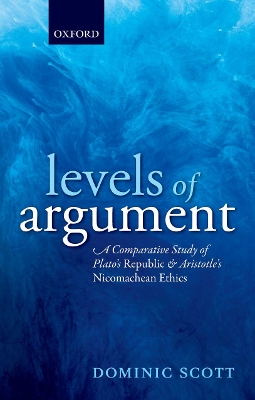In Levels of Argument, Dominic Scott compares the Republic and Nicomachean Ethics from a methodological perspective. In the first half he argues that the Republic distinguishes between two levels of argument in the defence of justice, the 'longer' and 'shorter' routes. The longer is the ideal and aims at maximum precision, requiring knowledge of the Forms and a definition of the Good. The shorter route is less precise, employing hypotheses,
analogies and empirical observation. This is the route that Socrates actually follows in the Republic, because it is appropriate to the level of his audience and can stand on its own feet as a plausible defence of justice. In the second half of the book, Scott turns to the Nicomachean Ethics. Scott argues that, even though
Aristotle rejects a universal Form of the Good, he implicitly recognises the existence of longer and shorter routes, analogous to those distinguished in the Republic. The longer route would require a comprehensive theoretical worldview, incorporating elements from Aristotle's metaphysics, physics, psychology, and biology. But Aristotle steers his audience away from such an approach as being a distraction from the essentially practical goals of political science. Unnecessary for good
decision-making, it is not even an ideal. In sum, Platonic and Aristotelian methodologies both converge and diverge. Both distinguish analogously similar levels of argument, and it is the shorter route that both philosophers actually follow-Plato because he thinks it will have to suffice, Aristotle because he
thinks that there is no need to go beyond it.
- ISBN10 0198801610
- ISBN13 9780198801610
- Publish Date 29 March 2018 (first published 5 March 2015)
- Publish Status Active
- Publish Country GB
- Imprint Oxford University Press
- Format Paperback
- Pages 248
- Language English
